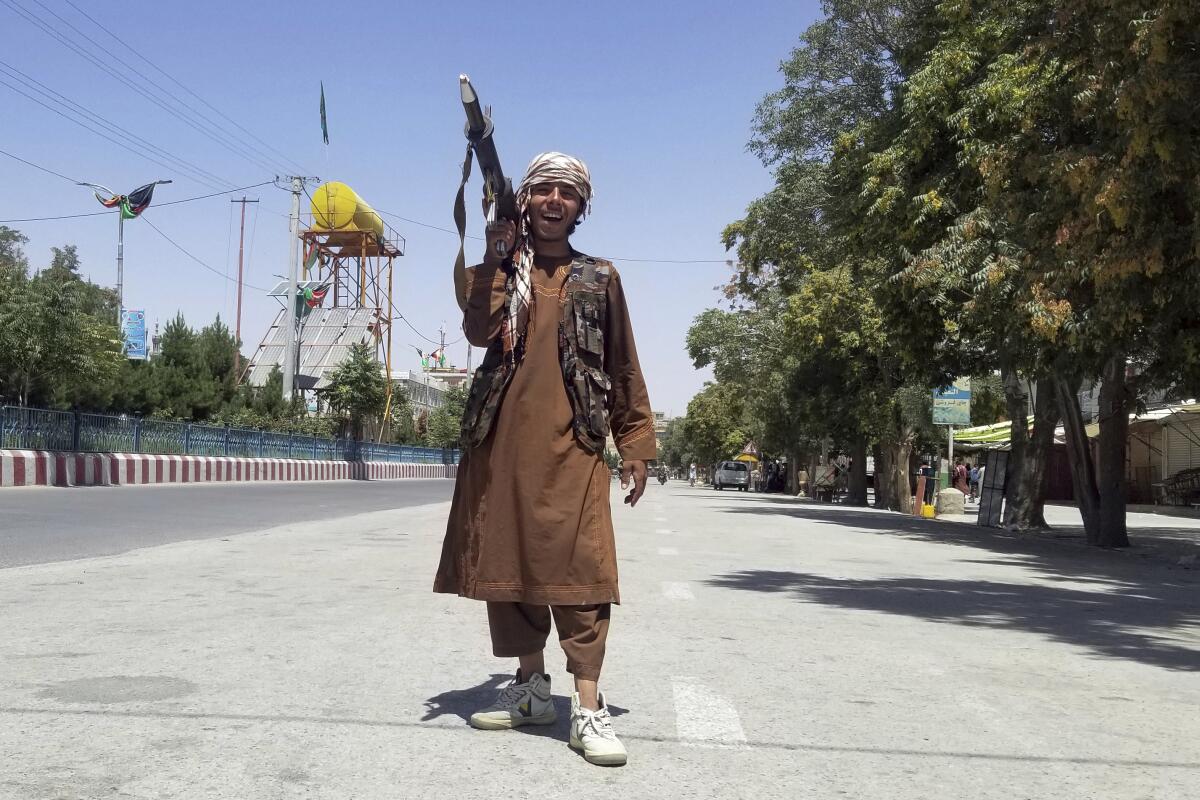Op-Ed: Afghanistan’s rapid fall shows Biden was right to pull out

- Share via
It has been excruciating to watch the Taliban roll across Afghanistan, undoing in a matter of months two decades of efforts by the Afghan people and the international community to build a decent, secure and functioning state.
The Taliban’s virtually uncontested takeover raises obvious questions about the wisdom of President Biden’s decision to withdraw U.S. and coalition forces from the country. However, the rapidity and ease of the Taliban’s advance provides a clear answer: that Biden made the right decision — and that he should not reverse course.
Biden doubted that U.S.-led efforts to prop up the government in Kabul would ever enable it to stand on its own. The international community took down Al Qaeda; beat back the Taliban; supported, advised, trained and equipped the Afghan military; bolstered governing institutions; and invested in the country’s civil society. None of that created Afghan institutions capable of holding their own.
That is because the mission was fatally flawed from the outset. It was a fool’s errand to try to turn Afghanistan into a centralized, unitary state. The country’s difficult topography, ethnic complexity, and tribal and local loyalties produce enduring political fragmentation. Its troubled neighborhoods and hostility to outside interference make foreign intervention perilous.
Biden made the tough and correct choice to withdraw and end a losing effort in search of an unattainable goal.
The case for withdrawal is also buttressed by the reality that even if the U.S. has fallen short on the nation-building front, it has achieved its primary strategic goal: preventing future attacks on America or its allies from Afghan territory. The U.S. and its coalition partners have decimated Al Qaeda in Afghanistan and Pakistan. The same goes for the Afghan branch of the Islamic State, which has demonstrated no ability to carry out transnational attacks from Afghanistan.
In the meantime, the U.S. has built a global network of partners with which to fight terrorism worldwide, share relevant intelligence and jointly boost domestic defenses against terrorist attacks. The U.S. and its allies are today much harder targets than they were on Sept. 11, 2001. Al Qaeda has not been able to carry out a major overseas attack since the bombings in London in 2005.
There is, of course, no guarantee that the Taliban won’t again provide safe harbor to Al Qaeda or similar groups. But that outcome is highly unlikely. The Taliban has been doing just fine on its own and has little reason to revive its partnership with the likes of Al Qaeda. The Taliban will also want to maintain a measure of international legitimacy and support, likely quashing any temptation to host groups seeking to organize terrorist attacks against foreign powers. Moreover, those groups have little incentive to seek to regroup in Afghanistan when they can do so more easily elsewhere.
Finally, Biden is right to stand by his decision to end the military mission in Afghanistan, because doing so is consistent with the will of the electorate. Most Americans, Democrats and Republicans alike, have lost patience with the “forever wars” in the Middle East. The illiberal populism that led to Donald Trump’s election (and near reelection) emerged in part as a response to perceived American overreach in the broader Middle East. Against a backdrop of decades of economic discontent among U.S. workers, recently exacerbated by the devastation of the pandemic, voters want their tax dollars to go to Kansas, not Kandahar.
The success of Biden’s effort to repair American democracy depends principally on delivering domestic investment; the infrastructure and social policy bills now moving through Congress are critical steps in the right direction. But foreign policy also matters. When Biden pledges to pursue a “foreign policy for the middle class,” he needs to deliver by pursuing a brand of statecraft that enjoys the backing of the American public.
Afghanistan deserves the support of the international community for the foreseeable future. But the U.S.-led military mission has run its course. Sadly, the best the international community can do for now is help alleviate humanitarian suffering and press Afghans to look to diplomacy, compromise and restraint as their country searches for a peaceful and stable political equilibrium.
Charles A. Kupchan, a senior fellow at the Council on Foreign Relations, is a professor of international affairs at Georgetown University and the author of “Isolationism: A History of America’s Efforts to Shield Itself from the World.”
More to Read
A cure for the common opinion
Get thought-provoking perspectives with our weekly newsletter.
You may occasionally receive promotional content from the Los Angeles Times.










